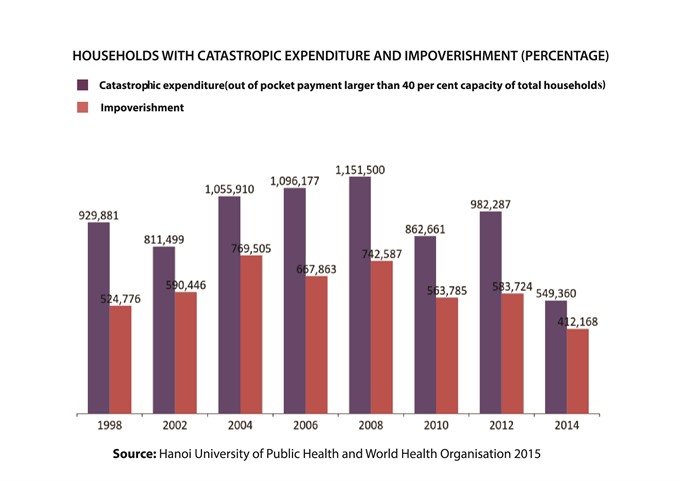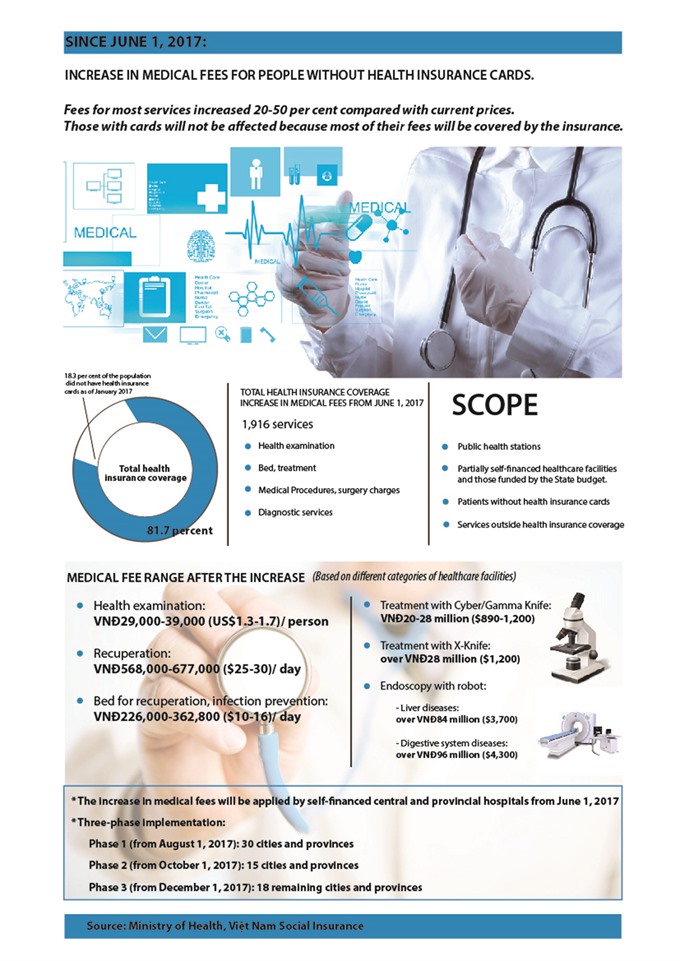 In the Spotlight
In the Spotlight
.jpg)
Phạm Mạnh Duy, 35, lives in Hà Nội’s Nam Từ Liêm District, has not thought about buying health insurance before.
 |
By Thu Trang- Mai Hiên
HÀ NỘI — Phạm Mạnh Duy, 35, a resident of Hà Nội’s Nam Từ Liêm District, can’t be bothered with getting a health insurance card.
It takes too much time to get a health examination with the card, and Duy, as a casual labourer can’t afford it.
It takes about three hours and a half to get a health examination. One has to show the health insurance card together with a personal paper, wait for one’s turn, have the doctors conduct the examination, take medicines, if any, and queue up to get the card back.
“And since 2015, it has become even more difficult for me to buy the card because we can get one only when the whole family gets them,” Duy said.
Duy’s wife, another casual labourer, lives in their hometown in northern province of Hà Nam, which means that he must apply for a certificate from local authorities to register for health insurance cards for his family in the capital city.
“It will take me at least one day to complete all of the procedures, and then wait for at least 30 days for the cards. I’m just too busy to earn my living,” he told Việt Nam News.
“My wife and I are young and healthy and the cards are not necessary,” he said.
Duy and his wife are among nearly 20 million Vietnamese who haven’t bought health insurance cards, and therefore, the one’s most affected by the recent upward revision in medical fees.
The Health Ministry’s Circular 02/2017/TT-BYT, which took effect in June, mandates that uninsured patients and those opting for services not covered by their health insurance scheme will have to pay the fees in full.
The latest increase in fees can have a person’s medical bill rise two to three times over the old rates, depending on where the patient gets treated.
“The new fees will significantly affect people without health insurance cards”, said Lê Văn Phúc, standing deputy director of the Department for Health Insurance Policy under Vietnam Social Insurance (VSI).
For instance, bed charges will increase from VNĐ354,000 ($15) to VNĐ632,000 ($28) in an ICU (intensive care unit) at central hospitals and to VNĐ568,900 ($25) at provincial hospitals.
Average expenditure for several days treatment at a provincial-level hospital can reach VNĐ5-7 million ($220-300), and VNĐ15-20 million ($660-880) at a central hospital in big cities, he said.
The fees will be much higher if surgery is involved, placing a heavy financial burden on the uninsured.
Agreeing with Phúc, Hoàng Văn Minh, Vice-rector of the Hà Nội University of Public Health (HUPH), said that studies by his institute show health expenditure of households has been increasing year by year and many are pushed into poverty by catastrophically high medical bills.
One study based on data obtained from the 2014 Việt Nam Living Standards Survey, a national representative household survey conducted by General Statistical Office of Việt Nam every two years, found that 2.3 per cent of Vietnamese households, nearly 550,000, have had to bear out-of-pocket healthcare bills that exceed their payment capacityby 40 per cent or more.The study also found that 1.7 per cent or nearly 413,000 households were impoverished (based on World Health Organisation methodology).
Minh said most of the uninsured people are casual labourers, or near-poor and middle income earners living in rural areas.
Their financial difficulties make many people hesitant to spend money on purchasing health insurance cards, he said.
Limited awareness about the importance and provisions of health insurance is another factor, Minh said, many people buy the cards only when they get signs that they are ill (adverse selection in health insurance terms).
Higher standards
The hike in medical fees has been welcomed by many doctors who say it will help patients enjoy better services.
Nguyễn Ngọc Hiền, deputy director of Bạch Mai Hospital, said the revised hospital fees were a step in the right direction.
In the past, fees did not cover all cost components and public facilities continued to depend on subsidies. The inclusion health worker salaries and allowances for health professionals like surgeons and medical technicians in calculating the cost of medical services will motivate health workers to serve clients better, he said.
If patients are not satisfied by the services provided, they can choose other facilities, Hiền said, adding that patients should be the centre of all policies.
Trần Văn Phúc, a doctor at the Saint Paul Hospital in Hà Nội, echoed Hiền, saying the hike in fees would enable patients to access high quality health services.
“As medical fees increase, patients have the opportunity to select the most effective, but safe, surgery or procedures as well as drugs,” he said.
For example, Việt Nam is well known for proficiency in cardiac surgery, but the country has only seven health facilities that offer open heart surgeries. Meanwhile, a population of 10 million Ontario province of Canada has up to 11 facilities which conduct open heart surgery. And so does Pennsylvania State in the US, which has 60 open heart surgery facilities. That is the reason why most patients with heart disease in the United States can get surgeries early, while patients here have to wait a long time a for their turn. This will certainly affect the life expectancy and mortality of patients with heart disease, Phúc said.
He added that the latest hike in medical fees was part of a road map set by the government towards making hospitals financially independent from VSI.
Accordingly, the government will support people in buying health insurance cards instead of allocating budgets for public hospitals. It will bring more equality into the healthcare system, he said.
Phúc also said that the increase in medical fees aims to push more people to apply for health insurance cards.
 |
Fair payment
While obtaining a health insurance card will reduce treatment costs for holders, doctors and other experts agree that policies relating to insurance and the medical services should be improved at the same time to ensure fairness in the healthcare system.
The latest increase in hospital fees certainly means inequality for underprivileged sections of the society, said a doctor who wanted to remain anonymous.
Many people, particularly those who live in remote, mountainous areas are so poor that they cannot pay the lowest insurance fees. Their hardship will increase monumentally with the high increase in hospital fees, he said.
“Thus, before making this effective across the country, the government should prioritise better, focusing especially on supporting such people to ensure healthcare equality.”
The doctor said he’d witnessed many cases of patients who had health insurance cards for treatment one year and returned the next without one. They thought there was no need to buy insurance cards after recovering.
The cost of health insurance was a burden for many households, he said.
He cited as an example a household with four people residing in a rural area. They subsist on rice cultivation. They get 0.4 tonnes of unhusked rice per crop. After deducting all the expenses, including fertilisers and seedlings, the family gets 50kg of unhusked rice in profit. At VNĐ5,000 per kg (US$0.2), this is VNĐ250,000 ($11) in revenue from a crop that they have worked hard on for three months.
Improved coverage
Phúc of Việt Nam Social Insurance said the nation has made marked improvements in expanding health insurance coverage, from 10 per cent in 1995 to 82 per cent at present.
The Government is committed to expanding this to 90 per cent by 2020, he said.
Over the past several years, the Ministry of Health and Việt Nam Social Insurance have taken many measures to promote health insurance coverage.
The State has spent a lot of money to buy insurance for poor people, children under six and social welfare beneficiaries, he said.
Beside, the State supports people living near the poverty line with 70 per cent of the insurance premiums, and 30 per cent for students and those engaged in the agriculture, forestry and fisheries sectors, he added.
“In the coming time, the Ministry of Health and the Vietnam Social Insurance will strengthen administrative reforms and create more favourable conditions for people to access health insurance,” he said.
The average health insurance premium now is VNĐ702,000 (US$30) per person per year. And if all of members in a household get cards, the second person’s premiums will be cut by 30 per cent, and that of the third person by 40 per cent.
Getting universal
According to the World Health Organisation, out-of-pocket (OOP) health expense is an important indicator in achieving universal health coverage and sustainable development goals, Minh said.
A nation cannot achieve universal health coverage and meet health equity goals if out-of-pocket health expenses equal or exceed 30 per cent of total health expenditures, the WHO estimates.
The percentage of out-of-pocket health expenses as percentage of total health expenditure has decreased over the past years in Việt Nam, Minh said.
It has dropped from about 60 per cent in the 1990s to 40 per cent at present. However, more efforts should be made to reduce it to below 30 per cent, he added.
He cited Thailand as a good example to follow in this regard.
More than 99 per cent of the Thai population enjoy health insurance coverage. Out-of-pocket payment for healthcare in the country is less than 10 per cent.
To promote universal health coverage with equity in Việt Nam, it is necessary to raise awareness of local residents on the importance of health insurance cards. The procedures to buy the cards should be simplified so that people can easily get them. Last but not least, the government should strengthen protection for vulnerable groups in the society though health insurance schemes, Minh said.
He suggested that the Government of Việt Nam strengthens financial protection and health equity offered through the health insurance scheme. Procedures and methods for payment by insurance service providers should be reformed and the management capacity of health insurance systems strengthened, he said
Since people want diverse insurance products, the insurance policy should be more flexible so that more and more people can join schemes, said Hiền of Bạch Mai Hospital.
“The state should offer different levels of insurance instead of just one level. The amount of premiums can increase threefold from the current level, and patients should be able to choose any hospital that they want without showing approved documents from original registration one,” he said.
Hiền also suggested that people should be able to purchase health insurance cards online.
“People can purchase goods and air tickets online. Why can’t people buy health insurance cards online?”
Phúc of VSI said the Ministry of Health is compiling a supplement insurance package for people who want to get better benefits. For example, a patient normally gets VNĐ30-40 million (US$1,320-17,600) in reimbursement from the insurance company for a spinal surgery. But if they buy the supplementary insurance package, they can choose really advanced surgical techniques like those done by robots.
Lê Thị Lộc, a Hà Nội resident, said many patients were agreeing to pay their hospital bills directly despite holding health insurance cards.
“For me, personally, an increase in hospital fees is acceptable; however, the quality of medical service should improve as well,” she said.
On hearing about the hike in hospital fees, Duy of Hà Nam Province, he said he would consider buying health insurance cards for the whole family.
“Nobody wants to be ill. However, if we get chronic diseases, the health insurance cards will help ease the financial burden.”
Phúc of VSI said: “Sickness and diseases are unavoidable. No one can be certain that he/she will be healthy forever. They can be healthy this year, but fall ill the next.” — VNS
Nguyễn Ngọc Hiền, deputy director of Bạch Mai Hospital
“Enrolment in the health insurance programme shows social responsibility and helps ensure social security.”
Lê Văn Phúc, standing deputy director of the Department for Health Insurance Policy under the Vietnam Social Insurance
“The only advice for people without health insurance is please buy health insurance, because buying it is the only way to avoid a poverty trap. Sickness and diseases are unavoidable, and no one can be certain that he/she will be healthy forever. They can be healthy this year, but fall ill the next.”
Trần Văn Phúc, a doctor from Saint Paul Hospital
“There is a paradox in Viet Nam that many people hesitate to go to the hospital for heath examinations although it only costs several hundred thousand dong (VND100,000 is less than $5.00) while they are willing to spend more than one million dong for a meal that is not good for their health. As it is said, health is more precious than gold. You can’t do anything without good health.” |
.jpg)



